Cultural views on the navel
The cultural views of the navel vary significantly. In some cultures the navel is seen as sexually and culturally significant, and its exposure has been subject to a variety of cultural norms and taboos, based on concepts of modesty. The views, customs and fashions relating to the navel change from time to time, and such exposure has become more widely acceptable, as reflected in design of clothing.
Western culture
The public exposure of the male and female midriff and bare navel has been taboo at times in Western cultures, being considered immodest or indecent. It was banned in some jurisdictions.[1] Eventually, only female navel exposure was banned and not male because, it was argued, the simulation or upward displacement from vagina to navel was commonplace and obvious in women.[2]
Community perceptions have changed and exposure of female midriff and navel is more accepted today and in some societies or contexts it is both fashionable and common, though not without its critics. Although American teenage girls are more likely to wear shirts that reveal their midriffs, this kind of clothing is often banned in high schools and stores. It is also inappropriate to wear clothing that reveals the midriff in professional settings like places of work. The exposure of the male navel has not been as controversial nor as common, and is usually in the context of barechestedness. Exposure of the navel by females is commonly associated with the popularity of the bikini, of the crop top and low-rise clothing.
Film
In the United States, the Motion Picture Production Code, or Hays Code, enforced after 1934, banned the exposure of the female navel in Hollywood films.[3] The National Legion of Decency, a Roman Catholic body guarding over American media content, also pressured Hollywood to keep clothing that exposed certain parts of the female body, such as bikinis and low-cut dresses, from being featured in Hollywood movies.[4]
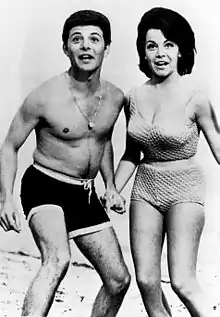
During the 1950s, Joan Collins was prohibited by the censors from exposing her navel in Land of the Pharaohs (1955). To get around the censors' guidelines, she wore a jewel, a ruby, in her navel.[5][6] Kim Novak wore a ruby jewel in her navel for the film Jeanne Eagels (1957); saying in an interview, "they had to glue it in every time. I got a terrible infection from it."[7] Marilyn Monroe, for a scene from Some Like It Hot (1959), wore a dress that revealed skin everywhere but had a tiny piece of fabric to hide her navel.[8] (The film was condemned by the National Legion of Decency, but for other reasons.[9][10])
By the 1960s, community standards had changed. Marilyn Monroe was allowed to expose her navel in Something's Got to Give (1962) and later commented, "I guess the censors are willing to recognize that everybody has a navel."[11] Ursula Andress, appearing as Honey Rider in the 1962 James Bond film, Dr. No, wore her iconic white bikini, which exposed her midriff and navel. However, when Annette Funicello was cast in her first beach movie Beach Party (1963), Walt Disney, who held her contract, insisted that she only wear modest bathing suits and keep her navel covered, to preserve her wholesome persona, though she was the only one of the ample number of young women in the film not bikini-clad.[12] In the 1967 film Follow That Camel, actress Anita Harris wore a jewel on her navel for a belly-dancing sequence.[13][14]
The Hays Code was abandoned soon after, and with it the prohibition of female navel exposure, as well as other restrictions. The influence of the National Legion of Decency had also waned by the 1960s. With the withdrawal of the Code and the change to a classification regime, the ban on the exposure of parts of the human body that had previously been regarded as immodest or indecent was withdrawn; and with it there was an increasing level of body exposure over time. The exposure of the navel ceased to be controversial in the context of a general increase in nudity.
During the late 1980s, Disney's animated heroines began exposing more skin as well. In the 1989 musical-fantasy film The Little Mermaid, the lead protagonist, Ariel, revealed her navel while wearing only fins and a seashell bra, a first in Disney's history.[15]
Television

In 1951, the United States Code of Practices for Television Broadcasters came into force, which, besides other things, prohibited female navel exposure on American television.[16] During the 1960s, Barbara Eden was not allowed to show her navel on the American TV show I Dream of Jeannie (1965–70).[17][18] Her pants had to be worn above the navel, which became ineffective. After a few frames of her navel exposure went unnoticed, they decided to use fabric and skin-colored makeup to conceal her navel.[19] Her costume became low-rise (without censorship) in 1985[20] and in 2013, Barbara Eden attended the Life Ball event in Vienna dressed in the same costume of I Dream of Jeannie but revealing her navel.[21][22][23] In February 1964, Scandinavian Airlines placed an advertisement in newspapers and magazines throughout the United States. It featured a blonde-haired, bikini-clad model exposing her belly button posing on a rock above the caption "What to show your wife in Scandinavia". The image that appeared in most publications had the belly button removed.[24][25]
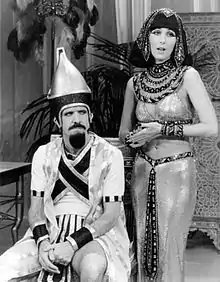
The first exposure of a navel in a TV series occurred in 1961 on the Dr. Kildare series.[26][27] Dawn Wells and Tina Louise were not allowed to expose their navels in Gilligan's Island (1964–67).[28] Wells was required to wear high-waisted shorts that covered her navel.[29][30] Wells stated in an interview, "Oh my goodness, I designed the shorts. Because it was the first short shorts ever on television and it had to cover my navel. Gilligan's Island actually gave censors headaches back in the '60s. Ginger's cleavage, and Mary Ann's navel were only allowed 3 seconds an episode."[31] The censors missed Nichelle Nichols showing her navel in the second-season Star Trek episode "Mirror, Mirror" (1967).[32] It is believed that it was due to Bjo Trimble that it went unnoticed.[33] Another episode of Star Trek, called "A Private Little War" (1968), also managed to get past the censors when Nancy Kovack's belly button was clearly visible in some shots and not covered by jewelry as seen when the fringe from her top was not covering it. In 1969, Mariette Hartley was not allowed to reveal her belly button in "All Our Yesterdays" (1969), the penultimate episode of Gene Roddenberry's Star Trek. Gene had Mariette expose not one but two belly buttons in the sci-fi film Genesis II (1973).[34][35][36][37]
In The Sonny & Cher Comedy Hour (1971–74),[38] network censors feared Cher's navel exposure would become a cause célèbre at CBS.[39] Cher once commented, "There were so many things that were censored—ideas and words. All I know is I got in trouble for showing my belly button, and every time I turned around after I went off the air, all you saw were Cheryl Ladd's boobs."[40] People magazine dubbed Cher "Pioneer of the Belly Beautiful".[41]
The American code of practice was suspended in 1983.[42][43][44]
Entertainment
1980s
Navel exposure became common in the culture of 20th-century music, starting in the 1980s, with many successful female popstars[45] having appeared on and offstage and in music videos with their midriff exposed, usually wearing a crop top, including Madonna, during 1983, she caused controversy when she wore a mesh crop top in her video for the song "Lucky Star". People magazine wrote that Madonna made the bare navel her trademark.[41]
Actress Cher wore an Indian princess outfit with feathers and beads around her navel for the 58th Annual Academy Awards event in 1986. California-based fashion designer Christine Albers commented, "the look is good for anyone who has a great body but especially for women who do a lot of stomach exercises."[46]
Paula Abdul's belly button was exposed in a fishnet see-through dress in the 1989 music video for "Cold Hearted"[47] and she appeared with a tattooed navel in the music video for "My Love Is for Real" in 1995.[48]

1990s and 2000s
During the early 1990s, Canadian country singer Shania Twain appeared in low-rise jeans baring her midriff and navel in her music videos and performances.[49][50][51] It became both the most widely discussed body part in country music and her trademark.[52][53] Shania once commented, "Someone said to me once, 'Well, if I had your belly-button I'd sell 8 million albums too.' But it takes a lot more than a belly-button to sell more than 8 million albums."[54] Jennifer Lopez is believed to have started the trend of exposing the navel on stage and red carpets.[55] It has been said Christina Aguilera has the most recognizable belly button in history.[56] People magazine stated, "The 19-year-old hotshot chanteuse behind 'What a Girl Wants', once a Mouseketeer alongside Britney Spears, can't quite pull off pop star flash without belly-flopping."[57] In 2001, the editors of Britannica commissioned an article on Britney Spears that deconstructs her bare midriff. The article describes Miss Spears's navel as "a heated boundary between baby and babe".[58] She had been a major inspiration for the navel piercing trend.[59] Spin magazine chose Madonna's navel as its "most incredible" rock star body part for a September 2005 feature.[60][61][62] Gregorio Luke, former director of the Museum of Latin American Art who conducted lectures about belly buttons, said, "The belly button has been a sign of beauty in goddesses as different as Astarte, Venus or Aphrodite. We ask which is more beautiful, the perfectly round belly button of Jane Fonda or Raquel Welch's grain of coffee navel? Every star from Madonna to Shakira proudly displays their belly button."[63][64]
On the contrary, American columnist Kathleen Parker in an article about Katharine Hepburn once commented, "Young movie-going girls today don't have access to many in the mold of Katharine Hepburn. Instead by mall observations most are Britney wannabes—hip-hugged, tattooed, pierced and out there. The female navel has become the refrigerator man's continental divide. I hate to break it to you, oh future daughters-in-law, but everybody's got a belly button. Your inney- or outey-ness is not the stuff either of revelation or revolution."[65]
Fashion
Exposed midriff is associated with the crop top, often in association with low-rise clothing. Another way that the navel may be exposed is via a deep plunging neckline dress or top that drops below the natural waist line.

Low-rise clothing started in the early 1990s, when the British magazine The Face featured Kate Moss in low-rise jeans on its March 1993 issue cover.[66] Models such as Gisele Bündchen frequently flash their midriffs.[67] In 1994, Art Cooper, editor-in-chief of GQ magazine said that his big seller in 1994 was the February issue with Geena Davis on the cover, on which she wore an Armani suit opened at the hips to reveal her navel,[68] It sold about 400,000 copies. He stated, "Part of the success is the navel factor. I think the belly button is really an erogenous zone."[69]
Navel piercing[70] and navel tattoos[71] has become more common among young women. The trend of piercing or tattooing the navel became popular in the 1990s.[72] It is popular among middle-aged women.[73][74] Actress Drew Barrymore has a butterfly tattoo beneath her navel.[75][76] The growing popularity of belly dancing, where navel exposure is typical, has also added to the navel exposure trend.[77]
Contrarily, advice columnist Ann Landers commented, "Navels are neither sexy nor obscene. I do not believe any female of good taste would wear an outfit where her navel shows. This does not include women in costumes or those on beaches in bikinis. The same goes for males. An adult male who wears hip-huggers so low rates zero minus 10 on the scale of taste—it's my opinion but it's one I feel strongly about."[78] Fashion historian James Laver told that he hasn't quite caught up with the idea of exposing the navel, saying, "I have never regarded that as a particularly attractive part of the human anatomy".[79][80] The navel fashion returned in the 1980s, when a New York City ban on exposing the navel in public was lifted.[1]
Since 2010, the crop top evolved by which women started wearing it with a high-rise skirts, jeans, or shorts that are high enough to cover the navel.[81][82][83] The bandeau top also made an appearance in formal wear, usually associated with a high-rise skirt or pants that cover the navel. Actress Halle Berry wore a bandeau with matching pants at the MTV Video Music Awards, fueling the trend of wearing a bandeau top as an out-of-home dress.[84] Miley Cyrus also wore a cropped bandeau top with high-waisted pants at the 2014 MTV Video Music Awards[85] and Jourdan Dunn wore a black bandeau top with matching maxiskirt.
Swimwear

Displays of the female navel commenced with the introduction of the bikini in 1946, designed by Louis Réard,[86] though two-piece swimsuits that exposed the midriff but covered the navel appeared in the 1930s. Réard could not find a model who would dare wear his brief design, so he hired Micheline Bernardini, a 19-year-old nude dancer from the Casino de Paris, as his model.[87][88] The uptake of the new-style swimsuit was very slow, and even then the bikini was not regarded as suitable clothing beyond the beach or pool. During the 1960s, Mary Quant's designs featured exposed navels and bare midriffs.[89] Exposure of the male navel was limited well into the 1960s. The swimwear covered the lower abdomen and usually the navel. Occasionally the swimwear would be worn immediately below the navel. The swimwear evolved to longer legs and lower waistline. Male swimwear could neither be worn above the navel nor below the knee in events of the National Collegiate Athletic Association (NCAA).[90]
Sports bikinis

Bikinis have become a major component of marketing various women's sports,[91] and most female athletes often wear a sports bikini that exposes the navel as the professional attire. Bulgarian athlete Ivet Lalova is known for her "tribal sun" tattoo around her navel.[92] Croatian athlete Blanka Vlašić is famous for her navel piercing.[93][94]
Cheerleading
The fashion later became increasingly popular through wearing styles, tops comprising modified sports bras without additional outergarments, sports bikinis, and cheerleading style fashions developing largely from the styles originating with the Dallas Cowboys Cheerleaders in the early 1970s.[95]
Tennis
Female tennis players are known for exposing their navels or navel piercings on court.[96] American tennis player Serena Williams was noted by the media for exposing her belly button piercing during her matches.[97][98][99] Similarly, retired Russian tennis player Anna Kournikova was known for frequent navel exposure during her matches.[100][101][102] In 2009, for an interview to the German magazine Der Spiegel when asked about her belly button showing during serves, she commented, "These are men's ravings.Why you should hide it, when it isn't necessary? Female beach volley ball players play in bikinis – does it bother anyone?"[103] American female golfer Laura Diaz commenting to the Ladies Professional Golf Association for Sports Illustrated, "The LPGA needs to acknowledge that a lot of people watch women's sports more for the women than for the sports. Why else would Anna Kournikova, who has never won a singles title, be the most popular player in women's tennis? We have quite a few attractive women, and we should use our looks to our advantage. After all, what's so wrong with seeing an occasional belly button?"[104][105]
American football
Males often wear no shirt with low-rise shorts during practice. This was somewhat upheld during practice of American football, which was carried over to wearing cropped jerseys during 1980s broadcasts. Cropped jerseys became dormant for 20 years until male athletes returned to midriff exposure[106] for comfort purposes. However, the NCAA has placed an official ban on navel exposure.[107] The National Football League has long placed a ban on navel exposure (It has since required jerseys to be tucked in.) and banned Elliott's crop top in September 2016.
Mediterranean, Hebrew and Middle Eastern cultures
Literature and philosophy
In the Hebrew Bible the Song of Songs emphasizes the navel as an important element of a woman's beauty.[108][109] It contains imagery similar to that in the love songs of ancient Egyptian literature.[108] Song of Songs 7:2 states: "Your navel is a rounded bowl."[110] The verse preceding the line mentioning the navel (Song of Songs 7:1) states, "your rounded thighs are like jewels, the work of a master hand",[110] ) and the verse following states, "Your belly is a heap of wheat."[110] Thus the treatment of the navel appears placed textually in between the description of the curves of a woman through thigh and the stomach or midriff.[109] "Belly" also suggests the womb, and the combination of the imagery of the womb with that of wheat suggests the link between eroticism and fertility through the imagery of the navel and curvaceous thighs.[109] These passages also celebrate a curvaceous stomach and midriff and plumpness as aspects of female physical attractiveness.[109]
The ancient Mediterranean, Hebrew, Israelite and Middle Eastern worldview commonly incorporated beliefs that shrines, important places (such as cities or capitals), or other such places of prominence had a position of centrality to the world and hence equated to the child-bearing, life-giving navel of a mother.[111] These domains constituted what contemporaries could regard as important bonds that linked the universe.[111] Thus Nippur, an ancient city of the Mesopotamian people, was often described as the "navel".[111] This usage expressed connotations of the prominence of the location and the way it was seen to function as a place of centrality and as a link between earth and the heavens and the Universe.[111] The Ancient Greeks regarded the conical stone Omphalos (meaning "navel") located at Delphi as the center of the earth.[111]
In a similar vein, Jewish Midrashim state: "God created the world like an embryo. Just as the embryo begins at the navel and continues to grow from that point, so too the world. The Holy One, blessed be he, began the world from its navel. From there it was stretched hither and yon. Where is its navel? Jerusalem. And its (Jerusalem's) navel itself? The altar."[111][112] This passage expresses the centrality of the ancient city of Jerusalem and of the altar of the ancient temple of Jerusalem within a cosmic framework equated to the navel of a mother and the source of life.[111] Similar concepts appear in the Book of Jubilees 8:19 and in the Book of Enoch 26:1, which describes Mount Zion as "The center of the navel of the earth".[111] Samaritan tradition sees Mount Gerizim as the navel of the earth, the only place not submerged in the deluge in the account of Noah's Ark.[111] The phrase "navel of the earth" occurs in (Ezek 38:12; Judg 9:37) Aramaic tibbur ("navel") and the concept recurs in Ezek 16:4.[111] According to Samaritan tradition, God made Adam from the dust of Mount Gerizim.[113] The belly-dancing tradition of Mediterranean and Middle Eastern cultures also celebrates the navel.[114] When Pope Urban II called (1095) for the First Crusade, he referred to Jerusalem as "the navel of the world".[115]
Bans and controversies
In Egypt, dancing in public with an uncovered navel is illegal, so many dancers wear a body stocking or netting to cover their skin.[116] An Egyptian girl named Rubi upset members of parliament and the TV authority enough to institute a ban on music videos when a woman's navel appears.[117][118]
Indian culture
Ancient times
While the West was relatively resistant to midriff-baring clothing until the 1980s, it has long been a fashion with Indian women.[119] These women, especially those from Southern India, have traditionally worn saris that bare the midriff.[120][121] Women from Rajasthan leave the midriff exposed while wearing Ghagra Cholis.[122] These women often cover their heads with dupattas,[123] and may cover their faces in front of strangers with ghoonghats. There is a belief associated with the religious in India that navel-baring has a symbolic, almost mystical, association with birth and life, and that the display is meant to emphasize the centrality of nature in the nurture role.[124] In ancient Indian tradition, the navel of the god Vishnu is considered to be the center of the universe and the source of life.[125] From his navel a new world emerges. This has been depicted in many ancient Indian sculptures as a lotus emerging from the navel on which god Brahma is seated.[126][127]
Although women in ancient India wore saris that bared the midriff, the Dharmasastra writers stated that women should be dressed such that the navel was never visible,[128] and navel exposure became taboo.[129] The trend of exposing the navel was started by women who were dancers, acrobats, or entertainers, and who developed a technique of wearing the sari like a pair of trousers well below the navel to assist in the free movement of the legs.[130] Women in this type of attire are very common in many ancient Indian sculptures,[131] and paintings.[132]
Indian sculpture emphasised the centrality and sexuality that emanated from the depiction of the woman's navel. One of the most stunning examples would be Didarganj Yakshi, a statue of a woman made during the Mauryan period. Carved out of sandstone, which gives it a natural shine where the navel is deeply embedded within the centre of the torso, drawing the focus of the viewer.[133] Before sculpting, the sculptors created an image and indicated the six structural centers, of which the navel is one, as defined by Yoga principles.[134] Technically, the typical female representation in ancient Indian art includes an hourglass figure with large hips, breasts, and buttocks, and a deep navel.[135] According to Indian physiognomy, if a woman's navel is deep, she is popular and loved by her husband. A broad, fleshy, shallow navel indicates a lucky woman. A woman with deep navel with a whirl to the right side is considered auspicious and is expected to lead a comfortable life.[136][137] Famous Indian painter M. F. Husain once commented, "The belly button has always been in. It has been an intrinsic part of the Indian woman. It has been part of Indian sculptures that go back so many centuries. That is why so many years ago, even in the 50s, all my works had women show their belly buttons."[138][139]
Recent times
With their migration to different countries, many Indian women began to wear the normal sari below the waistline, exposing the navel in a style known as a low-rise or low hip sari.[141][142][143] The trend started during the 1950s, when saris were worn below the navel, with big pleats that were tightly draped across the curves of the body.[144] Due to liberalization and changing global markets, saris are re-emerging as erotic apparel.[145][146] As a result, saris began to be designed in innovative ways using different materials, such as transparent and semi-transparent saris made of sheer fabrics like chiffon.[147][148][149] These modern saris may be draped in different ways,[150] such as a petticoat being tied about 10 to 13 cm (4 to 5 in) below the navel, just above the pubic area, and a small blouse ending just below the breasts with a thin pallu exposing some part of the blouse and almost the entire midriff.[151] In September 2012, The New York Times featured a wedding announcement with an image of a woman of Indian heritage displaying her navel in a gagra choli for the first time.[152][153] This style was popularised by Bollywood celebrities[154] and other popular regional film industries, such as Tamil and Telugu cinema.[155][156][157][158] In ancient Indian tradition, the navel of Lord Vishnu is considered to be the source of life and creativity. There's almost some sort of fascination with the navel in India, because it is considered to be a symbol of birth and life. That means in ancient India, women would wear sari that bared their midriffs.[159]
Indian television actors have followed suit, wearing saris that expose more skin, including the navel, with viewers mimicking the styles.[160]
Some women wear navel jewels or navel piercings to emphasize the navel and enhance its appeal.[155][161][162] Another option is using bindis to decorate the navel.[163][164][165] Tattoos near or below the navel were becoming popular in cities such as Pune in early 2012.[166] Actresses Mandira Bedi and Chhavi Mittal are known for their unique tattoos on their navels.[167][168][169]
Sometimes the low-rise style is modified, with the navel being covered by the pallu when wearing a low-rise non-transparent sari. In some corporations in India, saris are required to be worn in a manner that avoids navel exposure.[170] Anita Gupta, Senior Vice-President at J. Walter Thompson in Chennai commented that formal wear for woman should not expose the navel.[171]
Indian cinema
Indian actresses have expressed comfort with the practice of exposing their navels in film, preferring it to showing cleavage and calling it uncontroversial.[172][173]
South Indian
South Indian actresses such as Silk Smitha, Simran, Kiran Rathod, Namitha, Trisha Krishnan, Anushka Shetty, Shriya Saran, Pooja Hegde, Ileana D'Cruz, Kajal Aggarwal, Mumtaj, Taapsee Pannu, Shruti Hassan, Tamannaah, Samantha Ruth Prabhu, Nayanthara, Shwetha Menon, Mamta Mohandas etc., are known for their navel exposure.[172][174][175] Actresses such as Ileana D'Cruz, Tamannaah, Shriya Saran, Pooja Hegde, Trisha Krishnan etc., are known for exposing their slimmed-down midriffs in song sequences.[176][177]
Tamil cinema
During the 1990s, scenes focusing on the female protagonist's navel were common in Tamil cinema.[178] Actress Sukanya became famous for a scene in the 1992 film Chinna Gounder, where the main protagonist spins a top on the female protagonist's navel.[179][180][181] The 1993 film Gentleman featured a scene in the song sequence where female protagonist's navel is poked with a sword.[182] In 1996, actress Nagma became known for acting in a food play scene in the Tamil film Love Birds, which involves the male protagonist breaking an egg and cooking it on her navel,[183][184][185] which was similar to a scene from Hot Shots! (1991) involving Valeria Golino.[186] In the early 2000s Simran Bagga was known for her navel exposure in films. Her pierced navel also drew many youths to the cinema for the 2002 film Pammal K. Sambandam. In 2005, Trisha Krishnan exposed her belly and navel in the movie Thirupaachi made her as the navel queen of South Indian cinema. In his review of Isai (2015), film critic Baradwaj Rangan stated that "Sulagna brings to mind the heroines of a certain era who were chosen not because they had beautiful eyes or a bewitching smile but because of the quiver-quotient of their navel when confronted by a close-up."[187] Film critic Sudhir Srinivasan wrote in a review for the 2016 film Aranmanai 2, "The emphasis is not so much on making a horror story that is novel, than it is on fixating on the heroine’s navel."[188]
Telugu cinema
Of the South Indian film industries, Telugu cinema more frequently has actresses expose their navels.[175][189][190] Film scholar Mahesh Kathi commented that Telugu cinema has a long history of "fondness for the navel", citing old South Indian temple architecture, which features numerous prominent displays of navels in their carvings, and calling such displays a "South Indian aesthetic sensibility". He continued, "Cinematically, while cleavage is just a peek at the bosom, the navel encompasses the woman's entire sensuality. The 1978 film Maro Charitra was the first to feature the scene where a top spins on the female protagonist's navel.[192]
Veteran Telugu film director Kovelamudi Raghavendra Rao's movies always have guaranteed navel show of the heroines.[193] He used to include the navel of the heroine in every possible frame[194] and exploit it in song sequences such as dropping of water, flowers, fruits, ice cubes etc., on the navel.[195] Prominent Telugu actor and director Dasari Narayana Rao had once commented, "When you see a heroine slightly removing her pallu to show her inside assets, you don't feel ashamed of it because of the artistic way in which Ragahvendra Rao projects it on the screen. Especially heroines' navels look most beautiful in his movies."[196][197][198] Telugu actor and politician Chiranjeevi had commented in a TV show, "If you want to know about fruits, you have to do one film with director K. Raghavendra Rao. He used to put all the fruits around the heroine’s navel (boddu)."[199][200] In 2016, actress Pragya Jaiswal had requested Raghavendra Rao to have a shot with fruits and flowers on her navel as part of a song sequence. She told in an interview,"That's the third day of shooting with KRR sir and we're canning a song. But actually he's not making any flower or fruit thrown at my navel or waist, that's why I took courage to ask him to hit my navel with them"[201][202]
The 2013 Telugu film Action 3D paid tribute to Raghavendra Rao with a song featuring his symbolic acts on the female protagonist's navel.[203][204][205] A song sequence in the 2012 Telugu spoof film Sudigadu features the main protagonist dropping a watermelon and a pumpkin on the female protagonist's navel.[206][207] Actress Monal Gajjar who has acted in the scene had commented on an interview, "When the hero throws it on my tummy I am supposed to scream with a strange sound and they told me they are not real, all are toy fruits."[208]
Bollywood

Female dancers of Bollywood have always exposed their navels, since Amrapali (1966),[209][210][211] with cameras focused on them.[212][213][214] In the 1968 Bollywood film Brahmachari, actress Mumtaz was seen in a Sharara sari showing her navel[172][215] for a song and dance number, "Aaj kal tere mere".[216] A Sharara has a long blouse top with a unique divided skirt bottom, which has less flow than lehenga. It fits like a loose pant until reaching the knee, where it flares out. The particular style of sari became extremely popular and was dubbed the Mumtaz Sari.[217][218] The 1981 film Ek Duuje Ke Liye, a remake of the 1978 Maro Charitra featured the replication of the "top spinning on the navel" scene with Rati Agnihotri.[219][220][221][222] She had stated in an interview,"Today, when someone asks me how I balanced the top, I don't have an answer.Those days we didn't have monitors, the luxury of too many rehearsals or retakes. I did what was expected of me, telling myself it was like dramatics day in school, only instead of the stage I was facing a camera".[223] The film Khalnayak (1993) was famous for the song "Choli ke Peeche" featuring Madhuri Dixit in navel-exposing attire.[224] In the 2003 film Jism, actress Bipasha Basu appeared in a foreplay scene with an ice cube on her navel.[212][225] Actress Aishwarya Rai showcased her navel in a brocade choli and dipped ghagra for the hit song "Kajra Re" in the film Bunty Aur Babli (2005).[226][227][228][229] Katrina Kaif became famous for her dance performance showcasing her navel for the item number Sheila Ki Jawani for the 2010 film Tees Maar Khan.[211][230] Film critic Baradwaj Rangan stated on his blog in a review for the film, "Katrina Kaif makes her entry in the well-shot, well-scored Sheela ki jawani song sequence, brandishing a belly button that seems to have a life of its own".[231] For the 2011 film The Dirty Picture, actress Vidya Balan had acted in a scene where an egg put on her navel becomes an omelette.[232] She stated in an interview, "It was difficult to control laughter and Milan used to wait to get me into the character because all this was part of the song and dance of those times to market the Silk phenomenon".[233] Recently, Rakhi Sawant appeared in an item song "Latto Ghuma Re Chora" for the 2012 film Rakhtbeej in which a top is spun on her midriff and navel. She stated in an interview that the filming was painful since the director spun the sharp-pointed top 30 times on her midriff.[234][235] Kareena Kapoor, Katrina Kaif, Deepika Padukone and Priyanka Chopra are the hottest navel and midriff exposing queens of Bollywood. They are also known as 'Fantastic Four' of Bollywood. Actress Richa Chadda had commented in an event that she was asked during a shoot to reveal her navel in high-waisted pants.[236][237]
Bengali Cinema
The navel culture is moderately popular in Bengali Industry. Though during the last decade it has been popularised. During the 1990s Actresses like Rituparna Sengupta, Rachana Banerjee, Indrani Halder, etc. started showing off their navels in sarees mostly. Actress Rituparna Sengupta shows her navel during recent times also. Her navel has been spotted often in her recent films... Actress Koel Mallick kept her navel hidden for a long time, but in the movie Arundhati (2014 film) she bared her tummy completely and showed off her navel which created a storm among the fans. But She had not exposed her navel anymore again after that movie. Actress Sreelekha Mitra did a bare tummy show in the movie Ashchorjyo Prodeep, in the scene she wore a blouse and petticoat and her stomach was bare. In recent times, Actress Raima Sen has shown off her navel twice. In the movie Roga Howar Sohoj Upay, Raima in a scene removes her saree and holds her lower belly in one hand in order to check her lower belly fat, her navel is seen from close up. In the web series Hello (web series) Season 1, in an episode, Raima is seen to be lying on her bed removing the pallu of her saree, and her husband is seen to be playing with her tummy, Raima then points to her navel and says that she wants a tattoo below it but her husband objects it. Actress Arunima Ghosh has done a couple of navel baring songs in the movie Bonku Babu and Eagoler Chokh. Swastika Mukherjee has shown her navel in the movie Shaheb Bibi Golaam and in the web Series Dupur Thakurpo. Actress Subhashree Ganguly has exposed her navel many times during the last eight years. She has bared her navel in the movies like Boss (2013 Bengali film), Romeo (2011 film), Bachchan (2014 film), and especially in the movie Prem Ki Bujhini where the hero often got distracted due to heroine's unintentional navel show. Subhashree is especially known for showing her navel in ultra-low waist dresses where a larger portion of her lower belly is also shown, but after her marriage, she has decreased her expose. Now rarely she exposes her navel. Actress Nusrat Jahan is quite regular with her navel show, from the onset of her career, even after her marriage she equally continues to show her navel. In the movie Khiladi (2013 film) the actress teases the hero by intentionally dropping her pallu and showing her navel. Another renowned actress Mimi Chakraborty has also started exposing her bellybutton in the last 2-3 years. Previously she did not show her navel and always kept it covered. But from the movie Total Dadagiri she started navel showing as she wore belly showing dresses in the songs of the movie. After some time she made a feather tattoo on her lower belly, after this incident she started full fledged navel showing in her movies and photoshoots mostly to show her tattoo. Her navel can be spotted in most of her recent photographs... Bengali Actress Srabanti Chatterjee is totally different, she has kept her navel hidden till date . Only in one of the songs of the movie Bagh Bandi Khela her pallu flies off and her navel is exposed for a couple of seconds, that's her first and last navel show to date. Actress Madhumita Sarkar showed her navel in the movie Love Aaj Kal Porshu. Madhumita has started full fledged navel showing in recent times as almost all of her recent posts in social media clearly show her navel.. Actress Ritabhari Chakraborty is also known for exposing her navel in her toned abs and mostly ultra-low waist dresses.. Actresses like Bibriti Chatterjee and Rii Sen are known for baring their navel piercings in their pics. Besides actresses like Paoli Dam, Sayantika Banerjee, Tanusree Chakraborty, Koushani Mukherjee, Rittika Sen has done occasional navel exposures .
Contradictions
The Censor Board of India for Indian cinema has created some limitations on "vulgar" visuals, such as restricting zoom shots of the navel, kissing the navel, and squeezing the navel and waist. It had been implemented during the 1990s.[238][239][240][241] Many films have faced censor cuts for navel scenes.[242][243][244][245]
Many actors have expressed mixed views on the display of and emphasis of the navel. Some feel displaying the midriff or navel cannot be considered exposing when compared to Hollywood films.[246] Actress Shilpa Shetty argued, "If navel-showing is obscenity, then our traditional Indian outfit—the traditional sari—should be banned in the first place."[247] Actress, BJP member and CBFC member Jeevitha while speaking on item numbers stated, "Dance numbers are okay, but girls don't need to dress vulgarly. They can wear skirts but not too much below the navel."[248][249] Telugu film director Krishna Vamsi commented, "All film-makers have problems with the censors. They sometimes object to showing the navel of a woman when, in other films, it is allowed. We cannot even question them. The censors should give us general rules in writing as to what is allowed and what is not, instead of taking decisions according to their whims and fancies."[250] Actor R. Madhavan commented, "I have often been embarrassed to see certain films I have done. ... when I see myself kissing a dancing heroine's navel in some films, I feel ashamed."[251] Actress Taapsee Pannu commented, "I believe the navel is overrated. I think sensuality can be expressed in other ways." Bengali actress Swastika Mukherjee said, "I am not very comfortable though I have tried wearing a lehenga choli with a stick-on in my navel."[173] Many actresses have opted to hide their navels by wearing trikinis for beach or pool scenes.[252][253]
Japanese culture
Early times

Japan has long had a special regard for the navel. During the early Jōmon period in northern Japan, three small balls indicating the breasts and navel were pasted onto flat clay objects to represent the female body. The navel was exaggerated in size, informed by the belief that the navel symbolizes the center of where life begins. On many middle Jomon figurines, the significance of the navel was emphasized with an indentation or hole. Sometimes, the importance of the navel was further enhanced by connecting with a line from the navel towards the chest.[254] Early Japanese poems feature many references to the female navel. In some, the word navel actually refers to an indentation or hole instead of the belly button.[255][256] The shape of the umbilicus of a newborn baby would be discussed at length. If a baby's navel points downward, the parents would brace themselves for a weakling child who will bring them woe. The thunder god Raijin, with his terrifying drums, great horns, and long tusks, was said to have an insatiable appetite for young navels, and mothers had to nag their youngsters constantly to keep themselves well covered up.[257] Due to the mythology, navel exposure was not encouraged in the earlier times. The traditional clothing of Japanese women has a wide cloth belt around the midriff to protect the belly and keep it warm. The Japanese believe the belly is the source of person's warmth and that the perfect navel is an innie.[258]
Modern times
Although navel exposure has become a recent trend in fashion in Japan, annual Heso Matsuri ("belly button festivals")[259] have been held in Japan since the late 1960s. The tradition of the Hokkaido Heso Odori ("belly button dance") began in 1968.[260] Dancers make their heso ("belly button") into a face, using paint, special costumes, and props. Many variations of the dance have been developed, leading to competitions among dancers, who compete for prizes in various categories.[261][262][263][264]
A similar type festival is held at Shibukawa, north of Tokyo. The idea was formed based on the location of Shibukawa, which is also referred to as the "Belly Button of Japan". The festival is based on a traditional Japanese form of entertainment where revelers paint a face on their torsos and stomachs to appear as a head. A kimono is wrapped around the waist, and the person's real head is hidden by a large cloth hat. The belly button is traditionally painted into a mouth. In recent years, modern motifs and Japanese anime designs have appeared in the festival.[265][266]
Sri Lankan culture

Ancient times

Sigiriya frescoes depict royal ladies wearing cloth draped as a dhoti, tied in a knot at the front and pulled down to expose the navel. They wear pleated robes from the waist upwards, as well a necklace, armlets, wristlets, ear and hair ornaments, and display their breasts. The ladies in waiting wear waist clothes, a few ornaments and a firm thanapatiya ("breast bandage").[267]
In the Sinhalese poetic work Kaviyasekara, a father advises his married daughter as to proper clothing, "Dress your garment above your navel, without exposing the fair bosom, and expose not your teeth in laughing."[268]
In his work Daily Code for the Laity (1898), the Buddhist leader Anagarika Dharmapala wrote that a sari blouse must be long, fully covering a woman's breasts, midriff, navel, and back.[269]
Recent times
In the 1980s and 1990s, a visible navel was very rare. By the late 1990s, the Bollywood connection and the media and technological changes that occurred in India had influenced Sri Lanka's fashion outlook, with the navel becoming a focus in the modern Sri Lankan wardrobe.[270] Sri Lankan films commonly depict the women of the country's earliest history as scantily clad with exposed navels, and the country has become more open to the topic in general.[270] In Nov 2015, Western Province Chief Minister Isura Devapriya stated that a school dress code for students and teachers would be issued requiring that the navel be covered. However, the Ceylon Teachers Union President Joseph Stalin condemned it and commented, "We condemn this statement. It is an anachronistic proposal. We see nothing wrong with teachers wearing sarees below the belly button. It may be that there is something wrong with Mr. Devapriya’s eye sight. We like to ask the Chief Minister whether the belly button is the main concern facing the education sector in the Western Province".[271]
Indonesian culture

In 2004, the President of Indonesia Susilo Bambang Yudhoyono spoke out against exposed navels, saying, "Indonesian women, who are known for their courtesy, should refrain from exposing their midriffs or belly buttons, which now seems to be taken for granted. There are many ways to express beauty, as part of aesthetics, and to express freedom but not by showing things that lead to pornography." He further added that while the state could not dictate dress codes, citizens were expected to respect the country's moral values and courtesy. A week later, a cabinet minister quoted Yudhoyono as saying that he felt "disturbed and uneasy" to see television shows in which women exposed their navels.[272][273]
In 2006, Agus Suwage, an Indonesian artist, installed his Pinkswing Park exhibit at Jakarta's international biennale.The exhibit was surrounded by massive panels with multiple pictures of a near-naked man and woman frolicking in a park. Within days of the exhibition's launch, Islamic fundamentalists had descended on the biennale, forcing its closure and demanding prosecutions. At first police claimed his work blasphemed the story of Adam and Eve; a few weeks later they told Suwage he faced five years in jail for producing pornography. The Indonesian parliament decided to introduce a sweeping anti-pornography law. The law imposes a rigid social template; couples who kiss in public will face up to five years' jail, as would anyone flaunting a "sensual body part"—including their navel—and tight clothing will be outlawed.[274][275][276] Due to this new anti-pornography law, topless bathing and surfing on the beaches of Bali, a common practice among tourists, would also be prohibited. The law would also affect older tribal women, who often still walk topless.[275][277][278] The introduction of a bill was attacked by women's rights campaigners in the country, who fear it is the first step towards the implementation of Islamic Sharia law.[279][280]
Despite these laws, pop singers such as Inul Daratista, known for her hip swaying moves,[275][281][282] and Agnez Mo continue exposing their navels, but undergo some restrictions in advertisements.[283]
Korean culture
Traditionally, Korean women are expected to dress modestly. The traditional wear such as Hanbok cover the entire body.[284]

1990s
During the 1990s, the fashion trend among young South Korean women for wearing cropped T-shirts that leave the midriff exposed had started, due to the hot climatic conditions. The trend spread to create changes in female fashion such that when a policeman in Gwangju arrested two young women for flaunting their belly buttons in the street, the judge threw the case out, ruling that the flashing of a female navel was not indecent.[285] It further became popular due to Korean pop culture, where K-pop stars started wearing body piercings[286] and midriff-exposing shirts.[287] In July 1997, the South Korean broadcaster KBS announced tough new rules for pop stars appearing on TV. One among the many limitations was "no exposing of navels".[288]
2000s
During the 2000s, it became common among young women to expose their belly buttons by rolling up their shirts similar to a crop top. During sport events such as football, the female audience apply body paints or temporary tattoos around their belly buttons.[289] In 2010, Korean girl group Rainbow's dance routine that involved lifting up their shirts to expose their navels became popular. The band stated in an interview, "We have to keep our abs in shape for the belly button dance."[290] But the routine was subsequently has been banned.[291][292][293] The SBS TV show Inkigayo told girl groups to restrain showing their skin too much and about their outfits.[294][295] In 2013, Yoona, a member of Korean girl band Girls' Generation, caused a minor controversy by revealing an exposed midriff featuring a protruding cantaloupe-like outie navel, which started a spirited discussion and polarized opinions on the Chinese-language internet.[296][297]
Although, the formal wear is expected to cover the stomach and belly button.[298]

Malaysian culture
In 2005, Vivienne, a virtual girlfriend created by software maker Artificial Life Inc. of Hong Kong, was reprogrammed not to bare her navel or display body piercings in conservative Muslim countries including Malaysia to avoid problems.[299] In 2006, Nik Abdul Aziz Nik Mat gave his blessings to an Islamic form of dance clubs to serve as entertainment outlets at Kota Bharu. He commented that there must be proper attire for women, including clothes that do not reveal the navel, saying Muslim women must be covered from head to toe except for their face and hands, while Muslim men must be decently dressed when in public.[300] Under Malaysian government rules for stage performances, a female artist must be covered from her shoulders to her knees. This law prevented pop icon Beyoncé Knowles from performing in navel-exposing attire in 2007.[301][302] Beyoncé canceled the show amid opposition from local groups, calling the cancellation a result of a "scheduling conflict".[303]
Views in alternative medicine from antiquity
Saint Thomas Aquinas considered the navel as the "bodily metaphor for spiritual things".[304]
Alternative medicine

Indian medicine
In Indian traditional medicine, the Cyperus rotundus tuber is made into a paste and applied around the navel to relieve pain caused by roundworms. Pomegranate plant juice and paste is used to treat snake bites; the juice is dropped into the nostrils, ears, and navel.[305] Applying a little bit of ghee or mustard oil on cotton and keeping it on the navel overnight is considered a remedy for dry lips.[306][307] Castor oil is applied to the navel of infants as a remedy for stomach aches.[308] The Gonds, a tribe from central India, apply Gloriosa superba rhizome extract over the navel and vagina to cause labour pain and perform normal delivery.[309]
According to Ayurveda, the navel is an important site in the human body. Nearly 72,000 subtle nerves, or nadis converge in this area.[310] By the principles of Ayurveda and yoga, the human body is made up of six chakras, with the Manipura chakra located at the spine directly behind either the navel or the solar plexus, depending on the system, while its kshetram, or superficial activation point, is located directly on the navel and represents the element fire.[311][312][313][314] Vayu or vital wind as specified in Ayurveda, is divided into five sub categories. Of these, Samāna Vayu, situated in the navel region, is believed to aid in digestion and give physical strength to the body.[315][316]
According to Ayurvedic principles, navel displacement is a condition in which the navel center shifts. This might create digestive disorders. Proper practice of yoga is considered to be a remedy to realigning the navel.[317]
Sri Lankan medicine
In Sri Lanka traditional medicine, a composition of herbs, powdered pepper, and water is applied as a paste to the navel as a remedy for stomach aches.[318] During difficulties in delivery, a betel leaf is placed on the woman's navel, which is believed to be under a spell.[319]
Russian medicine
Laying wormwood on the female navel or spreading a paste of reindeer lichen on the navel were considered by Russian women to make the delivery of a child fast and painless.[320]
Chinese medicine
In the Chinese art of acupuncture, the navel is sometimes referred to as 神阙 (shénquè, roughly translating to divine imperfection or mark of the ancestors). Often, the navel is used as a moxibustion point. However, the navel itself is not used in acupuncture due to the likelihood of infection.
References
- "New code may reveal navel". Mohave Daily Miner. 24 March 1985. Retrieved 20 April 2012.
- Elaine Perez Zickler (Spring 2001). "Elizabeth Bronfen, The Knotted Subject: Hysteria and Its Discontents". Bryn Mawr Review of Comparative Literature. 2 (2). Archived from the original on 16 January 2013. Retrieved 16 March 2012.
-
- Moseley, Rachel (2005). Fashioning Film Stars: Dress, Culture, Identity. British Film Institute. p. 136. ISBN 978-1-8445-7067-6.
- Kelly Killoren Bensimon (2006). The bikini book. Thames & Hudson. p. 22. ISBN 9780500513163.
- Ian Lendler (31 July 2007). "A timeline of TV censorship". CNN. Archived from the original on 20 April 2012. Retrieved 16 March 2012.
- Salamone, Frank A. (2001). Popular Culture in the Fifties. University Press of America. p. 76. ISBN 0-7618-2103-1.
- Joan Collins (1994). Three complete books. Random House Value Publishing. ISBN 9780517100745.
- Elisabeth Bronfen (1998). The knotted subject: hysteria and its discontents. Princeton University Press. p. 469. ISBN 9780691012308.
- "Kim Novak: The Curves are Gem-studded". The Miami News. 20 May 1964. Retrieved 17 March 2012.
- "The World's Belly Button". Vogue Italia. Retrieved 19 February 2012.
- Phillips, Gene (5 February 2010). Some Like it Wilder. University of Kentucky Press. p. 223. ISBN 978-0813173672.
- Films Condemned by the Legion of Decency
- Bob Thomas (24 July 1992). "Mystique endears 30 years after death". The Union Democrat. Retrieved 20 April 2012.
- "The Myth of the Hidden Navel". Beachpartymoviemusic.com. Archived from the original on 3 January 2014. Retrieved 20 February 2012.
- Lenika Cruz (26 January 2015). "Taylor Swift and the Fraught History of Navel-Gazing". The Atlantic. Retrieved 7 February 2015.
- "Should You Believe?". Shira.net. Retrieved 7 February 2015.
- Deborah Bradley (12 July 1995). "Disney animators give Pocahantas the sexiest cartoon image ever". Beaver County Times. Beaver, Pennsylvania. Dallas Morning News. Retrieved 9 December 2015.
And in 1989's "The Little Mermaid," rebellious teenager Ariel flashed her navel (a Disney first) wearing little more than fins, a couple of seashells, and some cleavage.
- Jerry Della Femina (2010). From Those Wonderful Folks Who Gave You Pearl Harbor: Front-Line Dispatches from the Advertising War. Canongate Books. p. 201. ISBN 978-1847679680.
- Gregory Bergman; Peter Archer (2011). I Watch, Therefore I Am: From Socrates to Sartre, the Great Mysteries of Life as Explained Through Howdy Doody, Marcia Brady, Homer Simpson, Don Draper, and Other TV Icons. Adams Media. p. 80. ISBN 9781440512414.
Network executives got around the censors on the first issue by pointing out that Jeannie slept in a bottle and not on Tony's bed. On the second issue, they had to agree never to show Barbara Eden's navel during the show.
- John E. Semonche (2007). Censoring sex: a historical journey through American media. Rowman & Littlefield. p. 201. ISBN 9780742551329.
In 1965 when the situation comedy I Dream of Jeannie premiered, the network censor barred showing of Barbara Eden's navel in her genie costume.
- "11 Great Milestones in Televised Nudity". Nerve.com. Retrieved 22 May 2013.
- David Hofstede (2004). What Were They Thinking? The 100 Dumbest Events in Television History. Back Stage Books. p. 100. ISBN 9780823084418.
- Ellie Krupnick (29 May 2013). "'I Dream of Jeannie' Costume Re-Worn By Barbara Eden, 78". The Huffington Post. Retrieved 11 August 2013.
- Adam Edelman (26 May 2013). "Barbara Eden, 78, dons iconic 'I Dream of Jeannie' costume onstage at Life Ball in Vienna". Daily News. New York. Retrieved 11 August 2013.
- Alison Schwartz (26 May 2013). "Barbara Eden Digs Up Jeannie Costume, Hangs with Bill Clinton". People. Retrieved 11 August 2013.
- "The Vanishing Belly Button, 1964". The Museum of Hoaxes. Retrieved 19 October 2013.
- "Censorship: Out, Damned Spot!". Time. 6 March 1964. Retrieved 19 October 2013.
- Marcel Danesi. Dictionary of Media and Communications (PDF). Archived from the original (PDF) on 17 May 2017. Retrieved 24 March 2017.
- Marcel Danesi (30 April 2016). Of Cigarettes, High Heels, and Other Interesting Things: An Introduction to Semiotics. Springer. p. 205. ISBN 978-0230612785.
- Brian Wallace. "The Liberalization of Television Programming [Infographic]". Business2Community.com. Retrieved 22 May 2013.
- Nojan Aminosharei (20 January 2011). "Televisionaries". Elle. Retrieved 22 May 2013.
- "11 Great Milestones in Televised Nudity". Nerve.com. Retrieved 22 May 2013.
- "Gilligan's Island's 'Mary Ann' has PNW connections". king5.com. Retrieved 1 February 2015.
- "Star Trek: The Original Series – Season 2 (1967)". GrouchoReviews.com. Retrieved 22 May 2013.
- "Hobnobbing with the Trimbles". Wunderland.com WebZine. Retrieved 22 May 2013.
- Charlie Jane Anders (2 October 2009). "A Sexy Lady With Two Navels Shows Dylan Hunt Her Agonizer". Io9.com.
- Mariette Hartley's Playboy Interview. Bookmice.net. originally "Mariette Hartley". Playboy. August 1982.
- "Trivia about entertainment". Corsinet.com.
- "Mariette Hartley Cherishes "All Our Yesterdays"". Startrek.com. 2 November 2011.
- Kelly Boyer Sagert (2007). The 1970s. Greenwood Publishing Group. p. 200. ISBN 9780313339196.
- Lillian Roxon (1978). Lillian Roxon's Rock encyclopedia. Grosset & Grosset & Dunlap. p. 466. ISBN 9780448145723.
- "The many mutations of The Sonny and Cher shows". TVparty. Retrieved 12 March 2012.
- "Bare navels back in fashion". The Milwaukee Sentinel. 14 April 1986. p. 2. Retrieved 17 March 2012.
- Associated Press. "Broadcasters Decide to Dissolve Their Radio-TV Advertising Codes". The Miami Herald, 6 January 1983, 19A. NewsBank. Web. 22 February 2013.
- Collins, Bill. "Changes Are Few in TV Ads". The Philadelphia Inquirer. 24 February 1983: C08. NewsBank. Web. 22 February 2013.
- Broadcasting, Self-Regulation of – The National Association of Broadcasters Codes of Practices, Broadcast Standards and Practices Archived 15 October 2014 at the Wayback Machine, JRank Articles
- Erin Mayer. "Can You Guess Which '90s Pop Star These Belly Button Rings Belong To?". Bustle.com. Retrieved 14 August 2014.
- "Bellybutton comeback". The Bryan Times. 14 April 1986. Retrieved 17 March 2012.
- "Paula Abdul Cold Hearted Pop song from 1989". bestsongsever.com. Retrieved 1 February 2015.
- David Bianculli (24 June 1995). "Michael Jackson's Not The Only Rock Veteran with a New Video". Chicago Tribune. New York Daily News. Retrieved 1 February 2015.
- Robin Eggar (2010). Shania Twain – The Biography. Simon and Schuster. p. 262. ISBN 9781451604542.
- "Grammy Magazine". 17 (1). National Academy of Recording Arts and Sciences (U.S.). p. 21.
- Sara E. Quay (2002). Westward expansion. Greenwood Publishing Group. p. 188. ISBN 9780313312359.
- Roy Shuker (2001). Understanding popular music. Routledge. p. 133. ISBN 9780415235099.
- Barbara Hager (1998). On Her Way – The Life and Music of Shania Twain. Berkley Boulevard. p. 64. ISBN 9780425164518.
- Dallas Williams (1997). Shania Twain: On My Way. ECW Press. pp. 232. ISBN 155022297X.
- Sheryl McCarthy (24 September 2003). "Actresses show more than we need to know". Boca Raton News. Newsday.
- Mary Anne Donovan (2010). Christina Aguilera: A Biography. ABC-CLIO. p. 47. ISBN 978-0313383182.
- "Christina Aguilera". People. 54 (12). 18 September 2000. p. 132. Retrieved 1 February 2015.
- Uhlig, Robert. (10 February 2001) "Britannica Spears at No 1 as internet encyclopaedia goes for pop". The Daily Telegraph.
- Hannah Orenstein (18 August 2016). "I Hated My Stomach Until I Pierced My Belly Button". Seventeen. Retrieved 24 March 2017.
- Madonna's navel tops 'Spin' list. USA Today. (23 August 2005).
- "Spin cites Madonna's navel". UPI. (23 August 2005).
- "'Spin' picks star parts, loves Madonna's navel the most". The Arizona Republic.
- "Long Beach Playhouse Presents "Belly Buttons," A new show by Gregorio Luke". Everything Long Beach. Retrieved 9 April 2012.
- Amanda Parsons (15 March 2012). "The Bellybutton". OC Weekly. Archived from the original on 4 April 2012. Retrieved 9 April 2012.
- Kathleen Parker (1 July 2003). "Hepburn Was A Classic Feminist". Times-Union. Warsaw, Indiana. Scripps Howard News Service.
- "Navel Mauvers". New York. 10 May 1993. p. 26.
- Esther Gross Kremer (7 May 2000). "Cropped tops = midriff mania = abs-olutely erotic". Daily News. New York. Archived from the original on 16 June 2012.
- "GQ Magazine". United States: LucyWho.com. February 1994. Retrieved 20 April 2012.
- "Varga Girls back in the pages of Esquire". The Milwaukee Journal. 14 December 1994. Retrieved 20 April 2012.
- Veronica Manlow (2009). Designing Clothes: Culture and Organization of the Fashion Industry. Transaction Publishers. p. 53. ISBN 9781412810555. Retrieved 9 December 2015.
Recently we've seen an emphasis in women's clothing on the hips and abdomen—low rise pants, halter tops, and even rings and jewels for the navel.
- Lawrence J. Prelli (2006). Rhetorics of Display. University of South Carolina Press. p. 327. ISBN 9781570036194.
- Jill Condra (2008). The Greenwood Encyclopedia of Clothing Through World History: 1801 to the present. Greenwood Publishing Group. p. 224. ISBN 9780313336652.
- Cindy Sigler Dagnan (16 August 2008). "Guest column: What happened to modesty?". The Joplin Globe. Retrieved 16 March 2012.
- Neha Kaura (20 May 2012). "Piercings make a fashion statement". The Times of India. Retrieved 25 May 2012.
- Cristina Gibson (24 August 2010). "Which Celeb Has a Butterfly on Her Belly?". E! Online. Retrieved 11 August 2013.
- Lloyd Boston (2010). Before you put that on: 365 daily style tips for her. Simon and Schuster. p. 155. ISBN 9781451628722.
- Rebecca Mead (10 May 1993). "Navel Maneuvers". New York. p. 26. ISSN 0028-7369.
- Ann Landers (24 June 1978). "Navel attraction questioned". Star-News. Washington.. Google News.com (24 June 1978).
- Kim Blair (2 March 1966). "Fashion Historian claims skirts shouldn't go higher". The Calgary Herald. Retrieved 15 March 2012.
- Kim Blair (4 March 1966). "Tights and Tunics due if skirts go shorter". The Spokesman-Review. Retrieved 15 March 2012.
- Brooke Brown (16 May 2011). "Crop tops return in a modest fashion". Deseret News. Archived from the original on 16 August 2011. Retrieved 16 March 2012.
- Tania Braukämper. "5 picks: retro-inspired crop tops". Fashionising.com. Retrieved 8 April 2012.
- Noelle Talmon. "Celebrity Style Watch: Belly Baring Crop Tops". Star Pulse. Retrieved 8 April 2012.
- "Heat relief, what suits are hot – from tops to bottoms", San Jose Mercury News, page 1E, 8 June 2001
- Stephanie Webber (24 August 2014). "Miley Cyrus Looks Sophisticated, Wears Black Bandeau and Leather Pants One Year After 2013 VMAs". Us Weekly.
- "The Evolution of the Two Piece Swimsuit". Glamoursurf Vintage Swimwear and Lingerie. 1 December 2008.
- Rosebush, Judson. "Michele Bernadini: The First Bikini". Bikini Science. Archived from the original on 27 September 2007. Retrieved 17 September 2008.
- Emily Mitchell, "The Bikini Turns 50", 1 July 1996, Volume 148, No. 1, Time
- Nadeane Walker (21 October 1969). "Quant Fashions Don't Reveal Everything". Reading Eagle. Retrieved 20 April 2012.
- Michael Popke (November 2009). "High School Swimming Moves Forward After Suit Ban". AthleticBusiness.
- Laura Grae Kilborn, "The Marketing Of Female Athletes", The Denver Post, 11 August 1998
-
- "Olympic fashion in Beijing". The Atlanta Journal-Constitution. Retrieved 11 February 2015.
- "Latest revealing sporting ink". Daily Telegraph. Retrieved 11 February 2015.
- Paul Martella. "Olympic crush: Ivet Lalova". Yahoo.com. Retrieved 11 February 2015.
- Sam Quinn (5 August 2012). "Ivet Lalova: Everything You Need to Know About 28-Year-Old Bulgarian Olympian". Bleacher Report. Archived from the original on 8 August 2012.
- "Beauties of Olympics". Estetica Magazine. 24 July 2012. Retrieved 15 May 2015.
- "How female high-jumpers raised the fashion bar". The Guardian. 2 August 2010. Retrieved 15 May 2015.
- Tim Delaney; Tim Madigan (2009). Sports: Why People Love Them!. University Press of America. p. 248. ISBN 9780761844891.
-
- Jones, Chris. "Queen of Diamonds Sets a Tummy Trend". The Evening Standard. Retrieved 11 February 2015.
- Lindsay. "#NeverForget Dinara Safina: A Modern Fairytale". changeovertennis.com. Retrieved 11 February 2015.
- Charles Bricker (31 August 2004). "Capriati Wins on Day 1". Orlando Sentinel. Retrieved 11 February 2015.
- Steve Wilstein (31 August 1997). "U.S Open features teen revolution". Daily News. Retrieved 11 February 2015.
- Nick McCarvel (30 January 2015). "9 of the best Serena Williams-Maria Sharapova matches". USA Today. Retrieved 11 February 2015.
- Ron Dicker (26 May 2004). "TENNIS; Williams Advances With Style". The New York Times. Retrieved 11 February 2015.
- "Venus and Serena Williams in pictures: their outrageous tennis outfits through the years". The Telegraph. Retrieved 11 February 2015.
- "Weeb Ewbank: A Man of His Era(s)". The Village Voice News. 1 December 1998. Retrieved 7 February 2015.
- Jeff Merron. "Hey, have you seen Anna?". ESPN. Retrieved 7 February 2015.
- David Whitley (15 December 2001). "Sex Sells, And Anna Sure Knows How To Make Guys Enjoy Tennis". Orlando Sentinel. Retrieved 7 February 2015.
- "Interview for German magazine Der Spiegel in New York". anna4ever.com. Archived from the original on 8 February 2015. Retrieved 7 February 2015.
- Laura Diaz (3 September 2001). "My Shot To attract new fans, the LPGA should take a lesson from our past and sell sex appeal". Sports Illustrated. Retrieved 7 February 2015.
- Elizabeth Beggs (2007). Tomboy: Sexuality in Women's Sport. ProQuest. p. 18. ISBN 978-0549257028.
- Marissa Payne (29 August 2015). "Ohio State's Ezekiel Elliott wants to trademark 'hero in a half-shirt'". The Washington Post.
-
- Emily Van Buskirk (19 August 2015). "The NCAA Bans Belly Buttons, Prompting Players To Cry Foul". The Sports Fan Journal.
- Andrew Greif (9 March 2015). "So long, college football 'crop-tops': NCAA bans jerseys with too little and facemasks with too much in 2015 rules changes". The Oregonian. Archived from the original on 17 November 2015.
- "Crop-Top Jerseys Banned". College Spots Business News. 11 March 2015. Archived from the original on 4 February 2016. Retrieved 13 November 2015.
- Jasmine Watkins (8 March 2015). "NCAA bans football players from wearing rolled-up jerseys". SportingNews. Archived from the original on 5 March 2016. Retrieved 13 November 2015.
- Avery Stone (2 April 2015). "Ezekiel Elliott says NCAA rule banning crop tops is 'silly'". USA Today.
- "NCAA bans players from showing abs in games". SI.com. SI Wire. 9 March 2015.
- Austin Ward (2 April 2015). "Ezekiel Elliott scoffs at jersey rule". ESPN.
- Graham Watson (9 March 2015). "NCAA rule bans players from wearing cropped jerseys in games". Yahoo Sports.
- Glen Erby (8 March 2015). "NCAA Bans Ezekiel Elliott Style Tucked Under Jerseys". Black Sports Online.
- Murphy Ronald E (1992) "Song of songs, Book of", in The Anchor Bible Dictionary, vol 6. p. 151
- Dobbs-Allsopp F. W. (2001) Annotation and commentary on "Song of Solomon" in 'The New Oxford Annotated Bible' (with the Apocrypha. Third Edition (Ed) Coogan, M.D. Oxford: Oxford University Press, 2001. page 966 from pages 959–968
- The New Oxford Annotated Bible. New Revised Standard Version. Oxford: Oxford University Press 2001.
- Sperling, D (1976). "Navel of the earth". In Keith Crim; Victor Paul Furnish; Lloyd Richard Bailey Sr.; et al. (eds.). The Interpreter's Dictionary of the Bible: An Illustrated Encyclopedia (Supplementary Volume). Nashville: Abingdon Press. pp. 622–623. ISBN 978-0687192694.
- Jellinek, Beth ha-Midrash, V, 63
- Gaster T. H. (1962). "Samaritans". In George Arthur Buttrich (ed.). The Interpreters Dictionary of the Bible. 4. Abingdon Press. p. 196. ISBN 978-0687192731.
- Hobin, Tina (2003) Belly Dance: The Dance of Mother Earth. Marion Boyars Publishers Ltd. London. New York p. 173-195. ISBN 978-0714530918.
- Pope Urban II's Speech Calling for the First Crusade: "Jerusalem is the navel of the world; the land is fruitful above others, like another paradise of delights."
- "BELLY DANCE EGYPTIAN STYLE". www.jasminjahal.com. Retrieved 10 May 2016.
- Maria Golia. "Meditations on the navel ban". nthposition.com. Archived from the original on 2 April 2015. Retrieved 29 March 2015.
- Maria Golia (20 July 2004). "Culture Briefs". The Washington Times. Retrieved 29 March 2015.
- Banerjee, Mukulika & Miller, Daniel (2003) The Sari. Oxford; New York: Berg ISBN 1-85973-732-3
- Dr. A. Sahayadoss; A. Saghayamary. "Traditional Clothing of Dravidians with special reference to Arimuti".
The author also dwells on the traditional way of wearing sari exposing stomach and the navel for both men and women of south India and its special significance.
- "Dressing the Indian woman through history". BBC News Magazine. 6 December 2014.
In southern India, even in colonial times, some women did not cover the upper part of their body.
- Lajpat Rai (2008). Social Science a Textbook in History for Class IX as per New Syllabus (Third ed.). VK (India) Enterprises. p. 148.
- India: A Cross-curricular Theme. R.I.C. Publications. 2010. pp. 42, 43. ISBN 9781741269116.
- Beck, Brenda (1976) "The Symbolic Merger of Body, Space, and Cosmos in Hindu Tamil Nadu" in Contributions to Indian Sociology; 10(2): 213–43.
- Jay Weidner; Vincent Bridges (10 December 2003). The Mysteries of the Great Cross of Hendaye: Alchemy and the End of Time. Inner Traditions / Bear & Co. p. 297. ISBN 978-0-89281-084-0.
- Los Angeles County Museum of Art; Pratapaditya Pal (1986). Indian Sculpture: Circa 500 B.C.-A.D. 700. University of California Press. p. 40. ISBN 9780520059917..
- Los Angeles County Museum of Art; Pratapaditya Pal (1988). Indian Sculpture: 700–1800. University of California Press. pp. 66, 101, 254. ISBN 9780520064775.
- Anant Sadashiv Altekar (1956). The Position of Women in Hindu Civilization, From Prehistoric Times to the Present Day. Motilal Banarsidass Publ. p. 380. ISBN 9788120803244.
- William Graham Sumner (2007). Folkways: A Study of Mores, Manners, Customs and Morals. Cosimo, Inc. p. 434. ISBN 9781602067585.
- Jyotsna Kamat (1 February 1980). Social Life in Medieval Karnataka. Abhinav Publications. ISBN 978-0-8364-0554-5.
- Alka Pande (13 June 2011). "Indian woman - an icon of fertility and abundance". India Today Magazine.
- Salabhanjika in Art Philosophy and Literature. Rajkamal Prakashan Pvt Ltd. 1979.
- Alka Pande (3 June 2011). "The Art of the Matter Indian woman – an icon of fertility and abundance". IndiaToday. Retrieved 8 March 2012.
- Alain Daniélou (2001). The Hindu Temple: Deification of Eroticism. Inner Traditions / Bear & Co. p. 42. ISBN 9780892818549.
- Rahul Peter Das (1991). "The romarājǐ in India Kāvya and Āyurvedic literature". In Gerrit Jan Meulenbeld (ed.). Medical literature from India, Sri Lanka and Tibet. E. J. Brill. p. 2. ISBN 9789004095229.
- Physiognomy Of Women. Aryabhatt.com.
- Rahul Peter Das (1991). "The romarājǐ in India Kāvya and Āyurvedic literature". In Gerrit Jan Meulenbeld (ed.). Medical literature from India, Sri Lanka and Tibet. E. J. Brill. p. 6. ISBN 9789004095229.
- "Navel-gazing, desi style!". Uma Nair, IANS. Indiaglitz.com (3 November 2005).
- Navel-gazing, desi style!. Glamsham.com.
- Brian M. Du Toit (1990). Aging and menopause among Indian South African women. SUNY Press. ISBN 978-0-7914-0390-7.
- Sari Below Navel – Enhance Your Beauty and Grace Archived 28 December 2013 at the Wayback Machine. Fancy-indian-saris.com.
- Style and Attraction – Saree Navel Dress. Ethnic Fashion Blog.
- Aasha Mehreen Amin; Kajalie Shehreen Islam; Srabonti Narmeen Ali (25 June 2004). "Fashion Reincarnated, Recycled, Refined". Star Magazine. Retrieved 13 April 2012.
- A Sexy Saree – Get Daring and Trendy!!! Archived 28 December 2013 at the Wayback Machine. Fancy-indian-saris.com.
- What makes a saree hot? Love Ethnic Fashion Blog.
- Margaret Maynard (2004). Dress and globalisation. Manchester University Press. ISBN 978-0-7190-6389-3.
- Jennifer Craik (1 December 1993). The Face of Fashion: Cultural Studies in Fashion. Taylor and Francis. ISBN 978-0-203-40942-8.
- Transparent Saree – Add Spice to Your Style!! Trendy Nidhi Blog.
- Informal Saree Draping at Utsav Fashion. Utsavfashion.in.
- Meanwhile: Unraveling the sari. The New York Times. (28 April 2005). Retrieved 11 June 2011.
- Patricia Zohn (9 October 2012). "A Tale of Two Brides". The Huffington Post. Retrieved 13 October 2012.
- "Veni Manickam and Vikram Thomas". The New York Times. 30 September 2012. Retrieved 13 October 2012.
- Ziya Us Salam (13 November 2014). "Sargam (1979)". The Hindu. Retrieved 1 February 2015.
- "Things heroines do to stay in limelight?". southie.in. Retrieved 3 August 2015.
- "Kona Cutting Samantha's Dresses". Gulte.com. Retrieved 3 August 2015.
- "Kona behind Samantha Navel show". Telugustop.com. Retrieved 3 August 2015.
- Hot Navel Saree. New Fashion Factory Blog.
- Saree Draping Culture at BharatSthali. BharatSthali.
- Kavita Awaasthi (3 August 2012). "TV girls take it up a notch". Hindustan Times. Retrieved 11 August 2012.
- Navel piercing – the new style mantra in Bollywood!. Daily.bhaskar.com (6 July 2011).
- Parvesh Handa (2007). Be Your Own Beautician. Pustak Mahal. p. 43. ISBN 9788122309737.
- Sadhna Shanker (6 October 2005). "Bindi morphs into hip accessory". The New York Times. Retrieved 18 March 2012.
- Wara Karim (7 December 2004). "Bindi- An Unbeatable Fashion Accessory". Daily Star. Retrieved 18 March 2012.
- Debarati S Sen (3 August 2014). "Flaunt your midriff". Times of India. Retrieved 7 February 2015.
- Neha Kaura (18 May 2012). "Tattoo culture picking up in Pune". The Times of India. Retrieved 24 May 2012.
- "Photo Feature – Stars and their Tattoos". Filmibeat.com. Retrieved 8 August 2015.
- "Chhavi's love embedded on her navel". Hindustan Times. 3 February 2009. Retrieved 8 August 2015.
- "Chhavi's love is embedded on her navel". Filmibeat.com. 20 January 2009. Retrieved 8 August 2015.
- Dr Saurabh Bhatia. Indian Corporate Etiquette. Saurabh Bhatia. ISBN 978-81-906964-0-1. Retrieved 11 June 2011.
- Nina Varghese; Raja Simhan T.E. (27 October 2006). "The workplace look". The Business Line. Retrieved 18 March 2012.
- Rise of the Navel – 'Bollywood navel fashion has led to re-emergence of sari'. India Today. (3 June 2011).
- "She who dares to bare". The Telegraph. Calcutta, India. 4 August 2008. Retrieved 13 March 2012.
- Shekhar (8 November 2012). "Sexy actresses' hot navel show in Telugu movies". Filmibeat.
- Shekhar (8 November 2012). "Sexy actresses' hot navel show in Telugu movies". Samachar.com. Archived from the original on 26 August 2014. Retrieved 24 August 2014.
- Vanaja Banagiri (7 October 2012). "Southern sirens". The Times of India. Retrieved 24 August 2014.
- "Hottest Celebrity Midriffs". indiatimes.com. Retrieved 24 August 2014.
- Sudha (9 October 2013). "பம்பரம் விட்டு, தேள் விட்டு, ஆப்பாயில் போட்டு... பாவம்தான் நடிகைகள்!" (in Tamil). Filmibeat.
- "Sukanya Profile". veethi.com. Retrieved 1 August 2015.
- Sudha (9 October 2013). "பம்பரம் விட்டு, தேள் விட்டு, ஆப்பாயில் போட்டு... பாவம்தான் நடிகைகள்!" (in Tamil). Filmibeat.
- Sowmya Rajendran (16 June 2017). "Sai Pallavi's debut in Telugu and Tamil: Here's some 'real beauty' coming our way". TheNewsMinute.com. Retrieved 15 February 2019.
- "Random Movies I Like – The Gentleman (1994)". gasbelly.blogspot.in. 4 July 2007. Retrieved 1 August 2015.
- வெத்தலை, வெத்தலை, வெத்தலையோ!
- Nagma – Love Birds Archived 1 June 2013 at the Wayback Machine
- Sudha (9 October 2013). "பம்பரம் விட்டு, தேள் விட்டு, ஆப்பாயில் போட்டு... பாவம்தான் நடிகைகள்!" (in Tamil). Filmibeat.
- Phoebe Hoban (12 August 1991). Chris Smith (ed.). "Navel Maneuvers". New York.
- Baradwaj Rangan (30 January 2015). "Isai: Lots of problems, but the preposterous plot pulls you through". The Hindu. Retrieved 1 February 2015.
- Sudhir Srinivasan (30 January 2016). "Aranmanai-2 : More navel than novel". The Hindu. Retrieved 7 February 2016.
- "Budugu Blah Blah – Kushi". Idlebrian.com. Archived from the original on 3 March 2015. Retrieved 24 August 2014.
- "Richa: 'I See 'Sexy-Navel-Show' Only Here'". greatandhra.com. Retrieved 6 July 2014.
- B. Madhu Gopal (20 May 2006). "On 'top' of the world". The Hindu. Retrieved 1 August 2015.
-
- Karthik Pasupulate (7 March 2014). "All the sexist things Telugu cinema heroes sing". The Times of India. Retrieved 1 August 2015.
- "Capturing women's navel in a sensual manner is KRR's forte". iluvcinema.in. Retrieved 1 August 2015.
- Priyanka Pulla (September 2005). "Allari Bullodu Review". fullyhyd.com.
- Jhummandi Naadam Archived 26 April 2012 at the Wayback Machine
-
- Karthik Pasupulate (19 February 2013). "What if all the sleaze gets censored out of Tollywood?". Times of India. Retrieved 3 August 2015.
- J Jagannath (20 July 2015). "The needless public discourse on sexism in Bahubali". Business Standard. Retrieved 1 August 2015.
- "Throwing Fruits Is Not My Mistake: Raghavendra Rao". gulte.com. Retrieved 1 August 2015.
- "A Bellyful of dreams". Archived from the original on 16 April 2015.
- "K. Raghavendra Rao". Archived from the original on 22 November 2012.
- "K. Raghavendra Rao Biography". Archived from the original on 9 September 2012.
- deepakkumarsenapati (25 May 2011). "Raghavendra Rao- Even a book cant say fully about him and his work". Time Pass.
- Venkat (1 July 2010). "'Jhummandi Naadam' Review: Old Concoction". GreatAndhra.com.
- "Dasari speaks about heroine's 'Navel'". Sulekha.com. 31 May 2010.
- Dasari praises Raghavendra Rao's Navel show
- "Dasari speaks about heroine's 'Navel'". Cine Josh. 29 May 2010.
- Suresh Kavirayani (26 May 2017). "Tollywood is a land of misogynistic motormouths!". Deccan Chronicle. Retrieved 4 June 2017.
- "Tollywood fast turning vulgarwood?". AndhraHeadlines.com. Archived from the original on 2 June 2017. Retrieved 4 June 2017.
- "Heroine To Director: Hit Me on My Navel". Gulte.com. Retrieved 25 March 2017.
- "I Want That Navel Shot". Retrieved 25 March 2017.
- "Action 3D's tribute to K Raghavendra Rao". idlebrain.com. Retrieved 1 August 2015.
- "Flowers, fruits and pots for Allari Naresh?". Telugumirchi.com. Retrieved 1 August 2015.
- "Neelam Upadhyaya Hot in Action 3D". e24telugu.com. Archived from the original on 1 May 2013. Retrieved 1 August 2015.
- "Review: Sudigadu- The trailer is far better than the movie". Telugumirchi.com. Retrieved 1 August 2015.
- "Naresh Not Leaving KRR In 'Action' Too". Gulte.com. Retrieved 1 August 2015.
- Y. Sunitha Chowdhary (23 August 2012). "Interview With Monal Gajjar". Cinegoer.net. Archived from the original on 26 August 2014. Retrieved 24 August 2014.
- Günther Schlee (2010). How Enemies Are Made: Towards a Theory of Ethnic and Religious Conflict. Berghahn Books. p. 95. ISBN 9781845457792.
Musical films produced in Bombay (Mumbai) target family audiences and are completely harmless in most parts of the world. Due to the particularities of Indian women's fashion, however, the navel of the dancers is often visible.
- "Dance of doom". The Standard. 1 April 2006. Archived from the original on 1 February 2015. Retrieved 13 March 2012.
- "Top navel shows of Bollywood". Times of India. 26 September 2012. Retrieved 3 August 2015.
- K. Moti Gokulsing; Wimal Dissanayake (2013). Routledge Handbook of Indian Cinemas. Routledge. p. 188. ISBN 978-1136772849.
- Piyasree Dasgupta. "Thank you Mr Bhansali for making Ranveer Singh an 'item boy' in Ram Leela". FirstPost. Retrieved 7 October 2016.
- Edward Buscombe (2003). Cinema Today. Phaidon. p. 388. ISBN 9780714840819.
Dancing has become increasingly eroticized, with the camera closing in on the female star's erogenous zones, especially the navel, which traditional costume conveniently leaves ...
- sareez (1 March 2011). "The 5 Most Trend Setting Saree Scenes of Bollywood". Sareez.wordpress.com.
- Sreya Basu (30 June 2011). "Bollywood's nine-yard seduction". GlamSham. Archived from the original on 2 September 2011. Retrieved 18 March 2012.
- sareez (28 February 2011). "Impress your man! Wear a 'Mumtaz-Style' Sari tonight!". Sareez.wordpress.com.
- Sharara saree and Bollywood. Bollywoodvogue.com (28 July 2010).
- Paromita Vohra (18 December 2010). "10 Most Romantic Moments: Intimate Affairs". India Today. Retrieved 1 August 2015.
- Roshmila Bhattacharya (24 January 2013). "Rati Agnihotri on her first hit-Ek Duuje Ke Liye". Mumbai Mirror. Archived from the original on 8 December 2015. Retrieved 1 August 2015.
- Rajiv Vijaykar. "Timeless LOVE" (PDF). prasadgroup.com. Archived from the original (PDF) on 6 October 2016. Retrieved 5 October 2016.
- "Raj's Top 100 films!". zulm.net. Retrieved 5 October 2016.
- Roshmila Bhattacharya (21 July 2015). "Rati Agnihotri: I was a rare North Indian girl doing well down South". Mumbai Mirror. Times of India. Retrieved 5 October 2016.
- Bhattacharya, Roshmila (21 November 2010). "Our heart goes dhak dhak again". Hindustan Times. Archived from the original on 29 November 2010. Retrieved 29 November 2010.
- "Parents Guide for Jism". IMDB.com. Retrieved 3 August 2015.
- Top 10 Navels in Cinema – Bollywood top 10 navel showing actresses. India Today. (3 June 2011).
- "Bollywood's top 10 navels". India Today.
- Hindol Sengupta (2009). Rampup: The business of Indian fashion. Pearson Education India. p. 32. ISBN 9788131719749.
- Bollywood's Ghagra moments. Unp.me (22 October 2010).
- Bharathi S. Pradhan (28 November 2010). "Katrina Kaif's navel victory". The Telegraph. Retrieved 3 August 2015.
- Baradwaj Rangan. "Review: Tees Maar Khan / Toonpur Ka Superrhero". baradwajrangan.wordpress.com. Retrieved 1 February 2015.
- "The dirty details behind the making of 'The Dirty Picture'". The First Post. 30 November 2011. Retrieved 7 February 2016.
- Anuj Kumar. "As beauty gets dirty…". The Hindu. Retrieved 7 February 2016.
- "'Rakhtbeej' starcast in Delhi along with Rakhi Sawant". Times of India. 26 May 2012. Retrieved 1 August 2015.
- https://www.youtube.com/user/Samaylivenews/search?query=rakhtbeej%5B%5D
- India Today Web Desk (18 November 2018). "Was asked to show navel in high-waist pants: Richa Chadha on women objectification in Bollywood". IndiaToday.
- Dhruv Badola. "When Richa Chadha Was Asked To Reveal Her Navel in High-waist Pants. Know Here!". topyaps.com. Retrieved 9 February 2019.
- Ratna Kapur (2005). Erotic justice: law and the new politics of postcolonialism. Permanent Black. ISBN 9788178241326.
- Shohini Ghosh (2005). "The Troubled Existence of Sex and Sexuality: Feminists Engage with Censorship". In Mala Khullar (ed.). Writing the women's movement: a reader. Zubaan. pp. 491–492. ISBN 9788186706992.
- Usha Rai (31 July 1994). "New censorship proposals on anvil". The Indian Express. Retrieved 17 March 2012.
- "Censor Guidelines". Chitraloka.com. Retrieved 3 August 2015.
- "Does this censor know Telugu, asks Tollywood". timesofindia.com. 23 October 2012. Retrieved 15 August 2014.
- "Censor Board against Shreya's navel Shivaji scene". Filmibeat.com. Retrieved 3 August 2015.
- "List of Censor Cuts in Aagadu". Gulte.com. Retrieved 3 August 2015.
- "Why 'A' Certificate for 'Power'?". iqlikmovies.com. Retrieved 3 August 2015.
- Rashtriya Sahara. Sahara India Mass Communication. 3 (7–12): 170. 1995 https://books.google.com/books?id=SxxuAAAAMAAJ. Retrieved 8 November 2015. Missing or empty
|title=(help) - Ahmed, Afsana; Sharma, Smrity (25 April 2006). "If navel is obscene, let's ban saris". The Times of India. Retrieved 4 January 2007.
- Dipti Nagpaul (1 March 2015). "Know Your Censors". The Indian Express. Retrieved 3 August 2015.
- Andre Borges. "22 Things We Know About The Indian Censor Board". Buzzfeed.com. Retrieved 3 August 2015.
- Sunil Kumar. "I want to be a free bird". rediff.com. Retrieved 15 August 2014.
- Rana Siddiqui Zaman (25 December 2009). "Wisdom of an idiot". The Hindu. Chennai, India. Retrieved 12 April 2012.
- "Heroines hiding their navel in bikini". idleindia.com. Archived from the original on 26 August 2014. Retrieved 24 August 2014.
- Ram Kumar (6 March 2013). "Why Taapsee Hides [Her] Navel". southdreamz. Retrieved 24 August 2014.
- Nelly Naumann (2000). Japanese prehistory: the material and spiritual culture of the Jōmon period. Otto Harrassowitz Verlag. p. 199. ISBN 9783447043298.
- Robin D. Gill (2007). "Balls". The Woman Without a Hole – & Other Risky Themes from Old Japanese Poems. Paraverse Press. p. 192. ISBN 9780974261881.
- Robin D. Gill (2007). "Balls". Octopussy, Dry Kidney & Blue Spots, Or, Senryû: Dirty Themes from 18-19c Japanese Poems. Paraverse Press. p. 192. ISBN 9780974261850.
- JAPAN: Navel Exercise Archived 24 April 2012 at the Wayback Machine – Time
- Bart King (2008). The Pocket Guide to Girl Stuff. Gibbs Smith. p. 204. ISBN 9781423607700.
- Bruce Roscoe (2007). Windows on Japan: a walk through place and perception. Algora Publishing. p. 308. ISBN 9780875864914.
- "43rd Hokkaido Belly Button Festival (Hokkai Heso Matsuri) Schedule". Japan Fresh Powder. 26 July 2011. Archived from the original on 12 February 2012. Retrieved 4 March 2012.
- Furano Heso/Belly Button Festival. Furano-kankou.com Archived 16 January 2013 at the Wayback Machine
- James (30 July 2009). "Hokkaido Belly Button Festival". Japan Probe. Archived from the original on 16 April 2014. Retrieved 2 June 2014.
- Sandy (30 July 2008). "The 40th Belly Button Festival". Travel on Cloud 9.
- Sorensen, Callie. (5 July 2008) Furano Belly Button Festival. Whereiscallie.blogspot.com.
- Muramoto, Hiroyuki. (28 July 2008) Celebrating the navel in Japan's "belly button". Reuters.
- Shibukawa belly button festival Archived 17 April 2014 at the Wayback Machine. Japan Probe (30 July 2008).
- "The Garb of Innocence: A Time of Toplessness". Living Heritage Trust. republished from Romesh Fernando (15 November 1992). "The Garb of Innocence: A Time of Toplessness". The Island.
- James De Alwis (1870). A descriptive catalogue of Sanskrit, Pali, & Sinhalese literary works of Ceylon. Ceylon: W. Skeen, government printer. pp. 201–202.
- Kumari Jayawardena; Malathi De Alwis (1996). Embodied Violence: Communalising Women's Sexuality in South Asia. Zed Books. p. 299. ISBN 9781856494489.
- Vihanga Perera (20 May 2012). "Navel warfare". The Nation. Archived from the original on 16 January 2013. Retrieved 24 May 2012.
- Piyumi Fonseka (10 November 2015). "Is navel the education sector's main concern: CTU". Daily Mirror. Retrieved 24 March 2017.
- "Contemplating Susilo's navel fixation". The Jakarta Post. (22 December 2004).
- "Indonesian President Bellyaches about Exposed Belly Buttons" – AFP. Glapn.org.
- Navel gazing ruled out as Indonesians button up. The Sydney Morning Herald. (24 February 2006).
- Miniskirts and hipsters threatened in Indonesia Archived 26 July 2014 at the Wayback Machine. Martinfrost.ws (28 March 2006).
- Ahh, the Indonesian porn bill. Javaliese.livejournal.com (3 March 2006).
- Amy Chavez (26 September 2008). "No More Surfing Naked!". The Bali Times.
- Amy Chavez (11 March 2006). "No more nude surfing in Bali". The Japan Times.
- "Indonesian fears over porn law". BBC News. 25 May 2006.
- Pam Allen (February 2009). "Women, Gendered Activism and Indonesia's Anti-Pornography Bill". Intersections: Gender and Sexuality in Asia and the Pacific (19).
- Bret Stephens (3 April 2007). "Hips don't lie" (PDF). The Wall Street Journal. Archived from the original (PDF) on 16 January 2013. Retrieved 2 June 2014.
- Inul to go ahead with KL concert Archived 20 June 2013 at the Wayback Machine. The Jakarta Post. (25 April 2005).
- Shariah in Aceh: Eroding Secular Freedoms Archived 16 January 2013 at the Wayback Machine. Scandasia.com (21 August 2010).
- Tina Kim Chu. "Korean Customs and Etiquette Handbook" (PDF). Retrieved 22 March 2015.
- "Navel-flashing Ruled Decent". Chicago Tribune. The Economist Newspaper Limited. 9 October 1994. Retrieved 22 March 2015.
- Cara Ribeiro. "Top 10 Idols with Piercings". Ningin. Archived from the original on 15 March 2015. Retrieved 22 March 2015.
- Rachel (10 October 2012). "Interview: SPICA talks about their comeback and lip-sync". HelloKpop. Retrieved 22 March 2015.
- Richard King; Timothy J. Craig (2003). Global Goes Local: Popular Culture in Asia. Hong Kong University Press. p. 320. ISBN 9789622095915.
- Rachael Miyung Joo (Fall 2006). "Consuming Visions: The Crowds of the Korean World Cup". The Journal of Korean Studies. 11 (1): 53. ISBN 1442234849.
- "Korean idol group Rainbow to debut in Japan this fall!". Tokyohive.com. Retrieved 3 August 2015.
- "Korean Girl Bands Bare More Skin in Japan". Chosun. 13 April 2013. Retrieved 3 August 2015.
- "No Belly Dance, Rainbow". asianrice.tv. Retrieved 3 August 2015.
- Syee22 (8 September 2010). "Rainbow 'Belly button dance', banned from broadcast". Daily kpop news.
- "Rainbow's Fans Disappointed Because They Were "Too Sexy"". KpopStarz. 9 February 2012. Retrieved 16 October 2013.
- 레인보우 '배꼽춤', 방송금지 "선정적, 수정 불가피". News.nate.com.
- "Korean starlet's belly button causes navel-gazing online". WantChinaTimes. 13 February 2013. Archived from the original on 16 October 2013. Retrieved 16 October 2013.
- "SNSD's Yoona shows off a new look and cute bellybutton". Korea.com. Archived from the original on 6 January 2013. Retrieved 16 October 2013.
- Un-yŏng Kim (1996). A Cross-cultural Reference of Business Practices in a New Korea. Greenwood Publishing Group. p. 157. ISBN 1567200192.
- Keith Bradsher (24 February 2005). "Sad, Lonely? For a Good Time, Call Vivienne*". The New York Times.
- PAS-style dance clubs. The Star.
- Sean Yoong (23 August 2007). "Pop Stars Learn: When in Malaysia ..." The Washington Post. Associated Press.
- Malaysian officials tell Beyoncé to cover up. Houston Chronicle. (23 August 2007).
- Beyonce To Put 'Clothes On It' For Malaysia ?
- Vithal C Nadkarni (24 May 2006). "The navel's key significance". The Times of India. Retrieved 28 August 2012.
- Ivan A. Ross (2003). Medicinal plants of the world: Chemical Constituents, Traditional and Modern Medicinal Uses. Humana Press. ISBN 9781588292810.
- Why Rahul Dravid puts ghee on his navel. Bangaloremirror.com. Archived 27 August 2011 at the Wayback Machine
- "8 Tips to Get Pink Lips Naturally". BollywoodShaadis.com. Archived from the original on 8 June 2013. Retrieved 20 May 2013.
- Sheela Rani Chunkath (12 January 2003). "A healthy ritual". The Hindu. Chennai, India. Retrieved 11 April 2012.
- R. D. Tribhuwan (2009). Body Image, Human Reproduction and Birth Control. Discovery Publishing House. p. 280. ISBN 9788183563888.
- Harish Johari (1996). Ayurvedic massage: traditional Indian techniques for balancing body and mind. Inner Traditions / Bear & Co. p. 77. ISBN 9780892814893.
- R. Venugopalam (2004). The Hidden Mysteries of Kundalini. B. Jain Publishers. ISBN 9788180560033.
- Harish Johari (2000). Chakras: Energy Centers of Transformation. Inner Traditions / Bear & Co. p. 2. ISBN 9781594779091.
- John Douillard (2004). The Encyclopedia of Ayurvedic Massage. North Atlantic Books. p. 33. ISBN 9781556434938.
- S. V. Govindan (2000). Ayurvedic Message for Health and Healing. Abhinav Publications. p. 106. ISBN 9788170173939.
- Harish Johari (2000). Ayurvedic healing cuisine: 200 vegetarian recipes for health, balance, and longevity. Inner Traditions / Bear & Co. p. 7. ISBN 9780892819386.
- Atreya (2000). Secrets of Ayurvedic Massage. Lotus Press. p. 22. ISBN 9780914955498.
- Swami Sadashiva Tirtha (2007). The Ayurveda Encyclopedia: Natural Secrets to Healing, Prevention, & Longevity. Sat Yuga Press. p. 265. ISBN 9780965804257.
- Philip Baldaeus (2011). "Jaffna and Kandy through the Eyes of a Dutch Reformed Predikant". In John Clifford Holt (ed.). The Sri Lanka Reader: History, Culture, Politics. Duke University Press. p. 206. ISBN 9780822349822.
- Paul Wirz (1954). Exorcism and the Art of Healing in Ceylon. Brill Archive. p. 247.
- Eve Levin (1991). "Childbirth in Pre-Petrine Russia". In Barbara Evans Clements; Barbara Alpern Engel; Christine Worobec (eds.). Russia's Women: Accommodation, Resistance, Transformation. University of California Press. p. 55. ISBN 9780520070240.